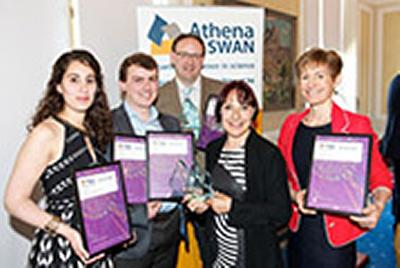Southampton Athena SWAN success signals new beginning for gender equality

The University of Southampton’s aspirations to improve fairness and equality for women have been rewarded through the Athena SWAN (Scientific Women’s Academic Network) Charter administered by the Equality Challenge Unit.
Not only did Southampton – a founding signatory of the Athena SWAN Charter – achieve the renewal of its Bronze award, the University also received its first departmental awards in recognition of building a solid foundation for eliminating gender bias and the development of an inclusive culture. The departments recognised include Chemistry, Electronics and Computer Science, the Faculty of Medicine and Ocean and Earth Science.
The Charter’s prime focus is on women's careers in STEMM (Science, Technology, Engineering, Maths and Medicine) disciplines. In November 2012, a Self-Assessment Team chaired by Professor Iain Cameron, Dean of the Faculty of Medicine, submitted an application to renew the University’s Bronze award, with the explicit aim of preparing the ground for a Silver award by 2015. A dedicated Diversity team helped to support individual bids with statistics and wider knowledge and insight gained from previous applications.

Professor Cameron said: “The University of Southampton is committed to providing the best career support for all staff. Athena SWAN gives us the opportunity to encourage best practice throughout our institution and celebrate the key contribution of women in science. My congratulations go to the many staff who worked with us to achieve these Athena SWAN Bronze Awards and continue to work with us as we progress towards Silver.”
Dr Martin Solan, Reader in Marine Ecology who was part of the Self-Assessment Team in Ocean and Earth Science said: “I am delighted that the many efforts we are making in support of gender equality are being formally recognised. We are already putting in place an action plan that will build on this achievement, and I look forward to continuing the journey that we have started.”
A key part of each submission is an action plan setting out steps that the individual Self-Assessment Teams will be taking over the next three years, to ensure that best practice truly becomes part of our culture. Since the University’s previous award in 2009, many research councils and other organisations have stipulated that they will be taking into consideration how well equality and diversity is embedded into universities.
Oceanographer and Associate Dean for the Faculty of Natural and Environmental Sciences, Professor Rachel Mills said: “We are beginning to move many of the barriers for women in academia by beginning to understand that when you see a group of people, not everyone is the same. Some may have had a career break to start a family, worked at a different pace, worked in a different way, or maybe have come and gone from an academic standard track and we are getting better at judging that.
“Athena SWAN recognises this, but it is the process of applying for these awards that has made us reflect and generated an understanding of where we were and where we want to be in the future. The Bronze Award is given very much for aspiration and the Silver Award is given for delivery. It’s fair to say that we’re now moving from the aspiration stage, towards delivery.”
University Vice-Chancellor, Professor Don Nutbeam added: “Over the last three years, a whole range of activities, initiatives, groups and committees have helped to define a solid bedrock in support of staff equality. Pivotal to this has been valuing and nurturing existing academic expertise, alongside a commitment to recruiting the best of global talent. This has highlighted some key areas where we want to improve, particularly in identifying, developing and promoting our talented women in addition to ensuring our reputation as a supportive environment for study, research and work.”